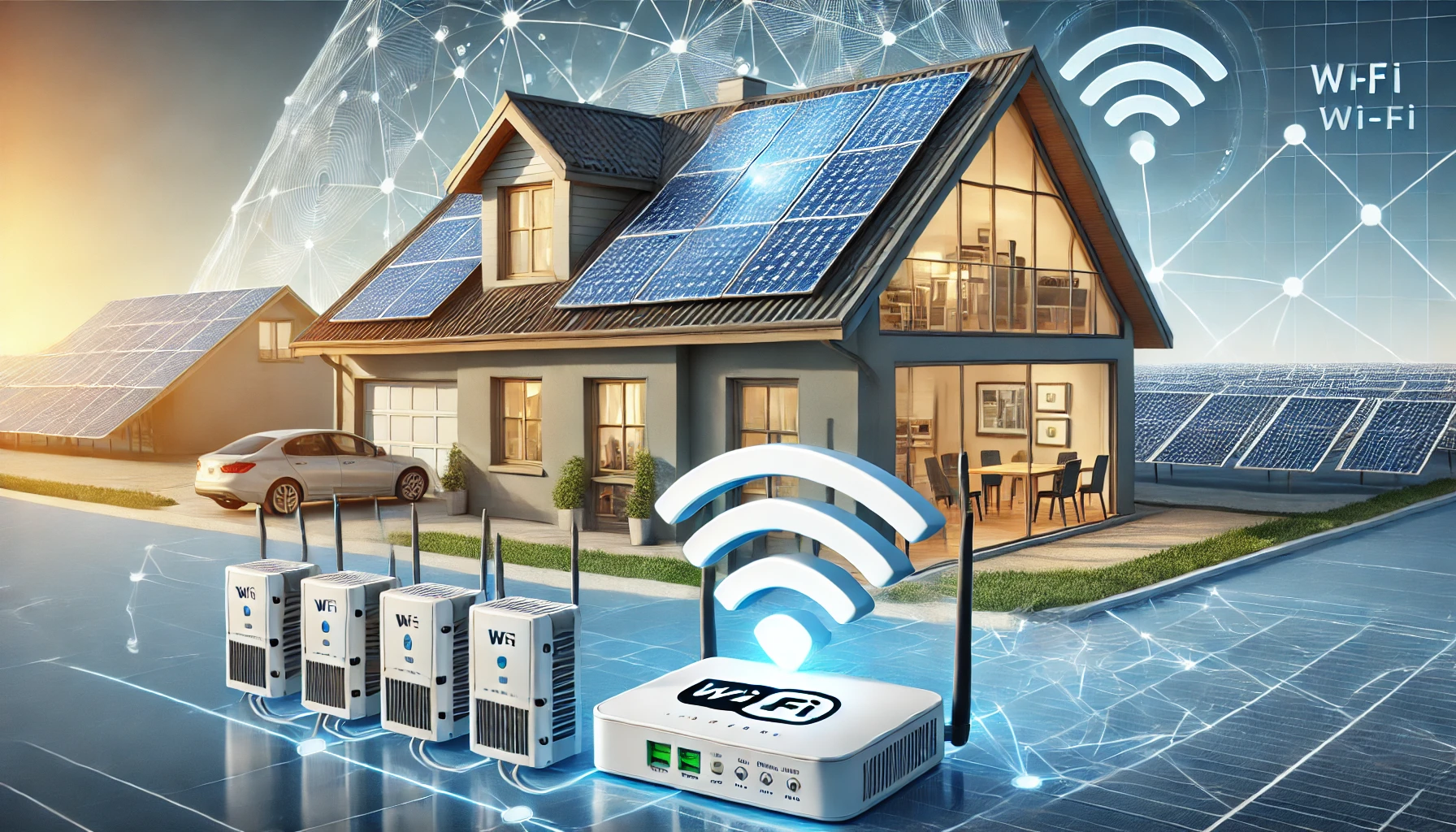As solar energy becomes a popular choice for sustainable living, concerns about its impact on daily technology, like Wi-Fi, have surfaced. With the increasing reliance on Wi-Fi for work, entertainment, and communication, the question arises: Do Solar Panels Effect Wifi? This article explores the relationship between solar panel systems and Wi-Fi to clarify potential concerns and ensure smooth functionality for both technologies.
Understanding Solar Panels and Their Function
Solar panels are devices that convert sunlight into electrical energy through photovoltaic (PV) cells. These cells are made from semiconductor materials, typically silicon, which generate an electric current when exposed to sunlight. This energy is transferred to an inverter, which converts it from direct current (DC) to alternating current (AC) for use in homes and businesses.
A complete solar energy system often includes several components: the solar panels themselves, an inverter, batteries for energy storage (if used), and the wiring that connects these elements. While solar panels are passive and do not emit electromagnetic signals, the inverter and associated electrical wiring may create minimal electromagnetic fields (EMFs), raising questions about their potential to interfere with nearby electronic devices like Wi-Fi routers. Understanding how these components function is key to evaluating their impact on Wi-Fi performance.
How Wi-Fi Operates
Wi-Fi is a wireless communication technology that transmits data using radio waves. It operates primarily on two frequency bands: 2.4 GHz and 5 GHz. These frequencies allow devices like smartphones, laptops, and smart home systems to connect to the internet without physical cables.
Wi-Fi signals are transmitted from a router, which acts as the central hub, sending and receiving data to connected devices. The signal strength and quality depend on factors such as:
- Distance between the router and the device.
- Physical obstructions like walls or furniture.
- Interference from other devices operating on similar frequencies (e.g., microwaves, baby monitors).
While Wi-Fi is generally robust, it can be affected by external electromagnetic interference. However, not all electronic devices produce interference significant enough to disrupt Wi-Fi signals. Understanding these dynamics is essential to evaluating whether technologies like solar panels might threaten Wi-Fi performance.
Do Solar Panels Effect Wifi?
Solar panels do not interfere with Wi-Fi signals; they are passive devices that only absorb sunlight and generate electricity without emitting electromagnetic signals. However, components of a solar power system, particularly the inverter, can potentially produce electromagnetic interference (EMI).
Inverters, which convert direct current (DC) generated by solar panels into alternating current (AC) used in homes, may emit small amounts of EMI, particularly if they are not properly shielded. This interference could theoretically affect nearby electronic devices, including Wi-Fi routers, especially if the inverter is too close.
That said, modern solar inverters are designed to meet strict EMI standards, minimizing their impact on other electronic systems. Additionally, most Wi-Fi systems operate on frequencies distinct from those used by solar equipment, reducing the likelihood of interference.
In most cases, Wi-Fi disruptions attributed to solar panels are rare and usually result from improper installation or outdated equipment rather than the panels themselves. With careful planning and installation, both systems can coexist without issues.
Factors That Could Influence Wi-Fi Performance in Solar Panel Systems
While solar panels don’t interfere with Wi-Fi, certain system or installation setup elements could impact signal performance. Key factors include:
- Inverter Proximity to the Router
The inverter, a critical solar system component, can generate electromagnetic interference (EMI). Installing too close to a Wi-Fi router might weaken signal strength or cause intermittent connectivity issues. - Quality of Inverter and Electrical Components
Poorly designed or low-quality inverters and wiring may emit higher levels of EMI, increasing the risk of interference. Modern, high-quality inverters are engineered to minimize such emissions. - Signal Obstructions from Solar Panel Installations
The physical presence of solar panels, particularly on rooftops, can sometimes create barriers that obstruct Wi-Fi signals. For example, the metal framework or additional infrastructure might reduce signal strength in certain parts of the home. - Shared Electrical Circuits
If the solar system shares electrical circuits with the Wi-Fi equipment, fluctuations or noise in the electrical system might indirectly affect router performance. - Router and Network Configuration
Older routers operating on crowded frequencies (e.g., 2.4 GHz) are more susceptible to interference from various sources, including solar equipment. Upgrading to dual-band routers or using mesh networks can reduce these vulnerabilities.
How to Prevent or Mitigate Wi-Fi Issues with Solar Panels
While solar panels rarely cause Wi-Fi issues, proper planning and installation can eliminate any potential concerns. Here are some effective strategies to prevent or mitigate interference:
- Strategic Placement of Inverters and Wi-Fi Routers
- Install solar inverters away from Wi-Fi routers to reduce the risk of electromagnetic interference (EMI).
- Place routers in centralized, open locations to maximize signal strength and minimize obstructions.
- Use Shielded Wiring
- Employ high-quality, shielded electrical cables in the solar panel system to prevent EMI from affecting nearby devices.
- Ensure that all connections are properly grounded to reduce electrical noise.
- Upgrade to Dual-Band Wi-Fi Routers
- Use modern routers that operate on both the 2.4 GHz and 5 GHz frequency bands. This allows devices to switch to the less congested band if interference occurs.
- Maintain Distance from Additional Electronics
- To avoid compounded interference, keep other electronic devices, like battery storage systems or monitoring equipment, away from routers.
- Opt for High-Quality Inverters
- To minimize the risk of signal disruption, choose inverters that comply with stringent EMI standards. Look for models certified by recognized organizations.
- Regular Maintenance
- Inspect the solar panel system periodically to ensure all components are functioning correctly and that no new sources of interference have arisen.
Expert Insights and Real-World Experiences
| Category | Details | Recommendations |
| Insights from Solar Technicians | – Modern inverters are shielded to minimize EMI. – Interference issues often arise from outdated equipment. | – Use high-quality inverters that meet EMI standards. – Maintain a 5–10 feet distance between inverters and Wi-Fi routers. |
| Wi-Fi and Networking Professionals | – Dual-band routers reduce susceptibility to EMI. – Router placement impacts signal strength. | – Upgrade to dual-band Wi-Fi routers (2.4 GHz and 5 GHz). – Place routers in open, elevated areas away from electrical equipment. |
| Real-World Experiences | – Homeowners report minimal Wi-Fi issues with professional installations. – Outdated inverters caused disruptions in rare cases. – Shielded cables resolved EMI-related signal problems. | – Hire qualified installers to ensure proper setup. – Replace older inverters with modern, EMI-compliant models. – Use shielded wiring for all solar system connections. |
FAQs
Do Solar Panels Effect Wifi?
No, solar panels themselves do not interfere with Wi-Fi. However, in rare cases, related components like inverters may produce minor electromagnetic interference (EMI) that affects Wi-Fi.
Can an inverter disrupt my Wi-Fi connection?
Inverters can emit EMI if they are poorly shielded or placed too close to a Wi-Fi router. Modern inverters, however, are designed to minimize this interference.
How can I prevent Wi-Fi issues when installing solar panels?
Ensure the inverter is installed at least 5–10 feet away from your Wi-Fi router, use shielded wiring, and upgrade to a dual-band router for optimal performance.
What if I experience Wi-Fi disruptions after installing solar panels?
Check the placement of your router and inverter. Relocating the router or inverter, upgrading your equipment, or using shielded cables can resolve most issues.
Are solar panels and Wi-Fi compatible?
Yes, solar panels and Wi-Fi systems are fully compatible. With proper installation and modern equipment, they can coexist without any issues.
Should I replace my old inverter to avoid interference?
If your inverter is outdated and causing disruptions, replacing it with a newer, EMI-compliant model can improve both system performance and connectivity.
Conclusion
Solar panels themselves do not interfere with Wi-Fi, but components like inverters can cause minor disruptions if improperly installed. You can ensure both systems work harmoniously with modern equipment, proper placement, and shielding. Embracing solar energy doesn’t mean sacrificing connectivity—professional planning and installation make it possible to enjoy both benefits without compromise.




One thought on “Do Solar Panels Effect Wifi?”